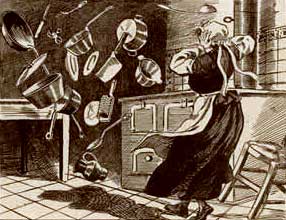The poltergeist comes from the German language, where the word means "noisy ghost". The English title is the lesser-known "Bump in the night".
The poltergeist is a common term for:
- Brief, violent hauntings - typically a few days to months
- The haunting seems to revolve about a person. Typically a teenager.
- Extremely personal hauntings. Reports suggest that these events know people's weaknesses, and use fear and shock to affect victims.
- The events will move with the victim.
- The events seem deliberately to isolate victims
- Things move, disappear, get stacked or formed in shapes by an apparent intelligence.
- Reports suggest that the victims feel threatened.
Many believe that the poltergeist phenomenon can be angry spirits, energies or even demons. Very rarely, there are reports of "nice" poltergejst phenomena. In a German tradition, one can mention: "I can not find my purse", after which it is found on a nightstand. This is not a confirmed event.
Many confuse poltergeist activities with everyday events. For example, sound from engines and vibrations from a road can be so powerful that things fall down or seem to be almost thrown. Doors can shut close due to draft. Walls and roofs can give to wind. Radiators can make clicking sounds, that can easily be heard through thick walls. Animal activity can also explain many of the phenomena.
What is left, is a core of phenomena, that cannot be explained. However, the phenomena are very short and transient, so it is very difficult to set up a controlled monitoring. Sadly, hoaxing is not uncommon.
Many confuse poltergeist activities with everyday events. For example, sound from engines and vibrations from a road can be so powerful that things fall down or seem to be almost thrown. Doors can shut close due to draft. Walls and roofs can give to wind. Radiators can make clicking sounds, that can easily be heard through thick walls. Animal activity can also explain many of the phenomena.
What is left, is a core of phenomena, that cannot be explained. However, the phenomena are very short and transient, so it is very difficult to set up a controlled monitoring. Sadly, hoaxing is not uncommon.



